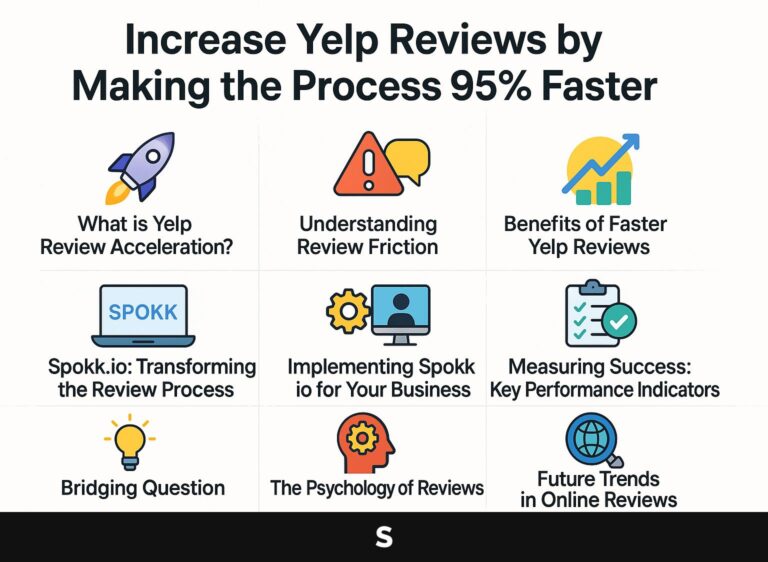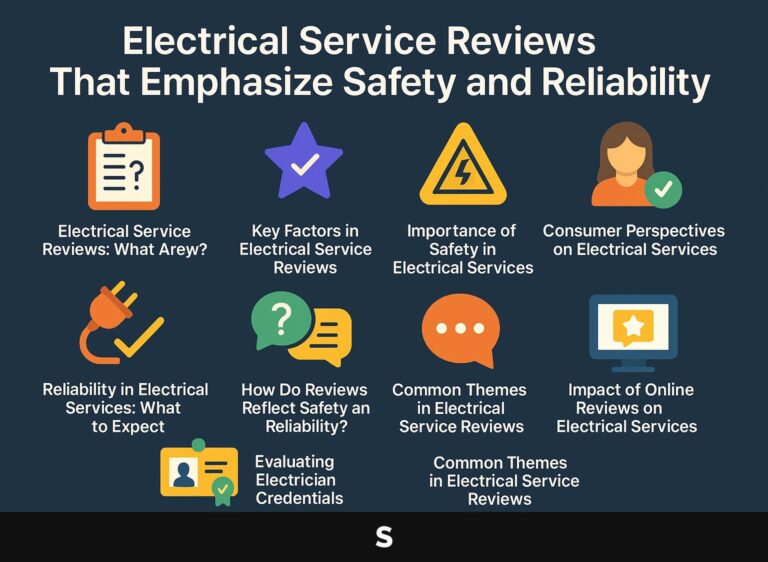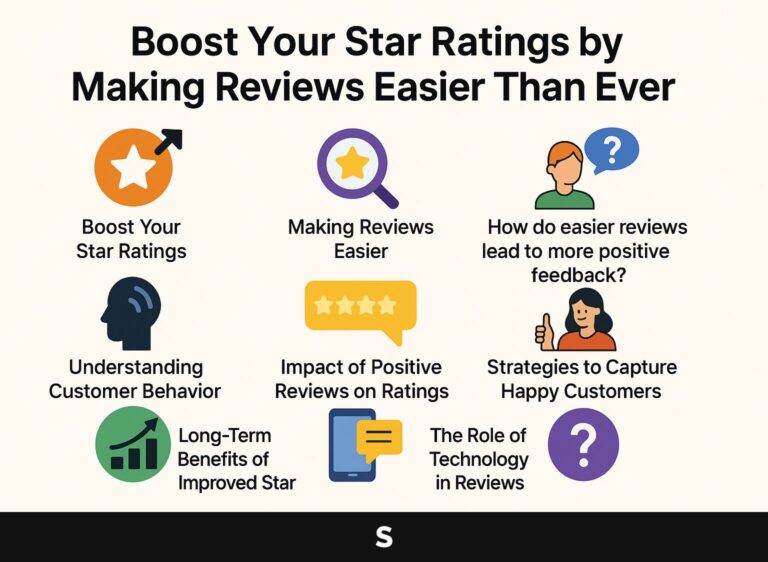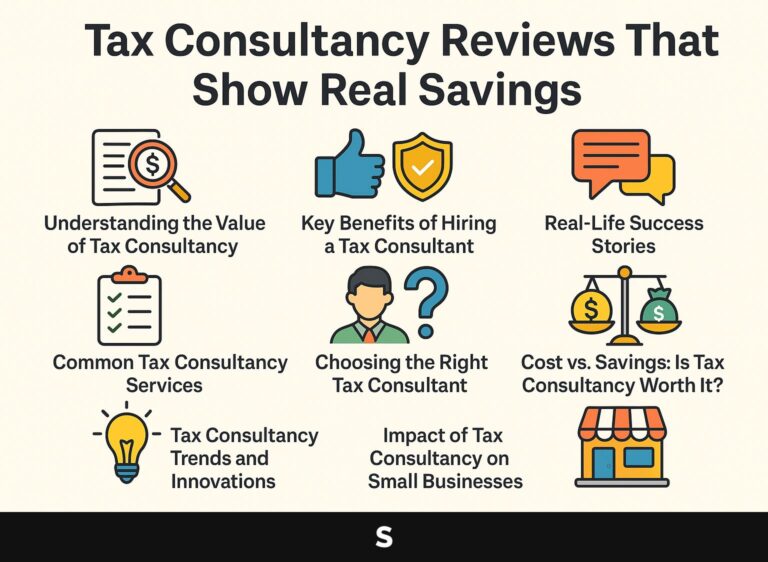Music School Reviews That Inspire Musical Journeys
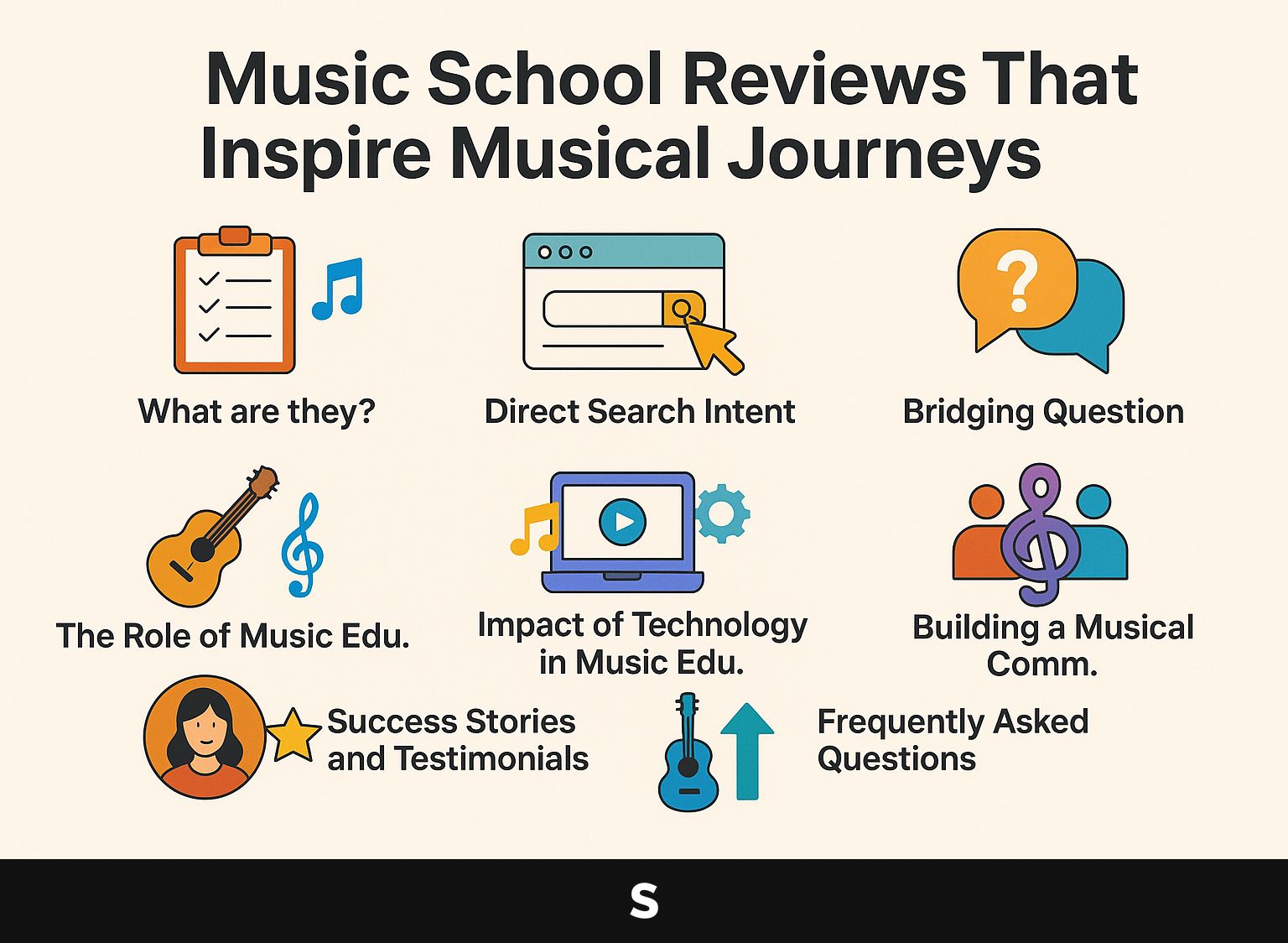
At the Nelly Berman School, stories of students like Botong and Ashwini show us that learning music can change lives, no matter how old you are. If you’ve ever felt uncertain about learning music, these reviews show how skilled teachers offer special opportunities to help you grow. Gain knowledge from the experiences of others to help you feel sure about your path in music-it’s never too late to begin creating music!
Key Takeaways:
- Comments from music schools can motivate and help new students as they learn music, highlighting the advantages of joining at an older age and the effect of concerts and a supportive place to learn.
- Personal experiences and the role of instructors can greatly shape music school reviews, while technology and a strong sense of community also play a significant role in the success of students.
- Testimonials and success stories demonstrate that a music school is reliable and show how music education can address students’ changing needs.
- Inspirational Reviews of Music Schools – What Are They?
- 1. How do music school reviews influence prospective students?
- 2. What makes a music school review inspiring?
- 1. What to look for in music school reviews?
- 2. How do personal experiences shape music school reviews?
- 3. What role do instructors play in student reviews?
- 4. How can student progress be showcased in reviews?
- 5. What are the benefits of attending music school later in life?
- 6. How do recitals and performances impact student confidence?
- 7. What elements contribute to a motivating learning environment?
- 8. How can reviews help students in learning music?
- Why Music Education Matters
- How Technology Affects Music Education
- Creating a Musical Community
- Success Stories and Feedback
- The Changes in Music Education
- Frequently Asked Questions
- 1. What is the purpose of music school reviews?
- 2. How can reviews of music schools influence my path in learning music?
- 3. Are all music school reviews positive?
- 4. What should I look for in music school reviews?
- 5. Can music school reviews help me choose the right school for me?
- 6. Do music school reviews only focus on the school’s reputation?
Inspirational Reviews of Music Schools – What Are They?
Reviews of music schools are strong statements that show both the teaching quality and the programs available. They also highlight the positive changes students experience during their time learning music.
1. How do music school reviews influence prospective students?
Prospective students often rely on music school reviews to gauge the effectiveness of programs and the experiences of past attendees, which can either encourage or dissuade their enrollment decisions.
These reviews can significantly impact confidence and skill development. For instance, a student from the Nelly Berman School shared that reading positive testimonials about their excellent faculty instilled a sense of trust, leading her to enroll.
Another review mentioned how the school’s supportive environment helped improve a student’s performance at national competitions. These reviews provide honest accounts, clearly highlighting the strengths of the institution and guiding future students in making informed decisions about their education.
2. What makes a music school review inspiring?
A great music school review often includes personal stories of improvement, emotional bonds, and emphasizes the important role teachers have in encouraging student success.
To write a clear review, highlight key points throughout the learning process. Describe how overcoming performance anxiety during a concert built confidence in adult learners at the Nelly Berman School.
Highlight the bonds formed with teachers, maybe sharing a specific lesson that led to a better grasp of music theory. Share emotional breakthroughs, such as the joy of playing a favorite piece for the first time. These elements will give readers a clear look at the life-changing experience the school offers.
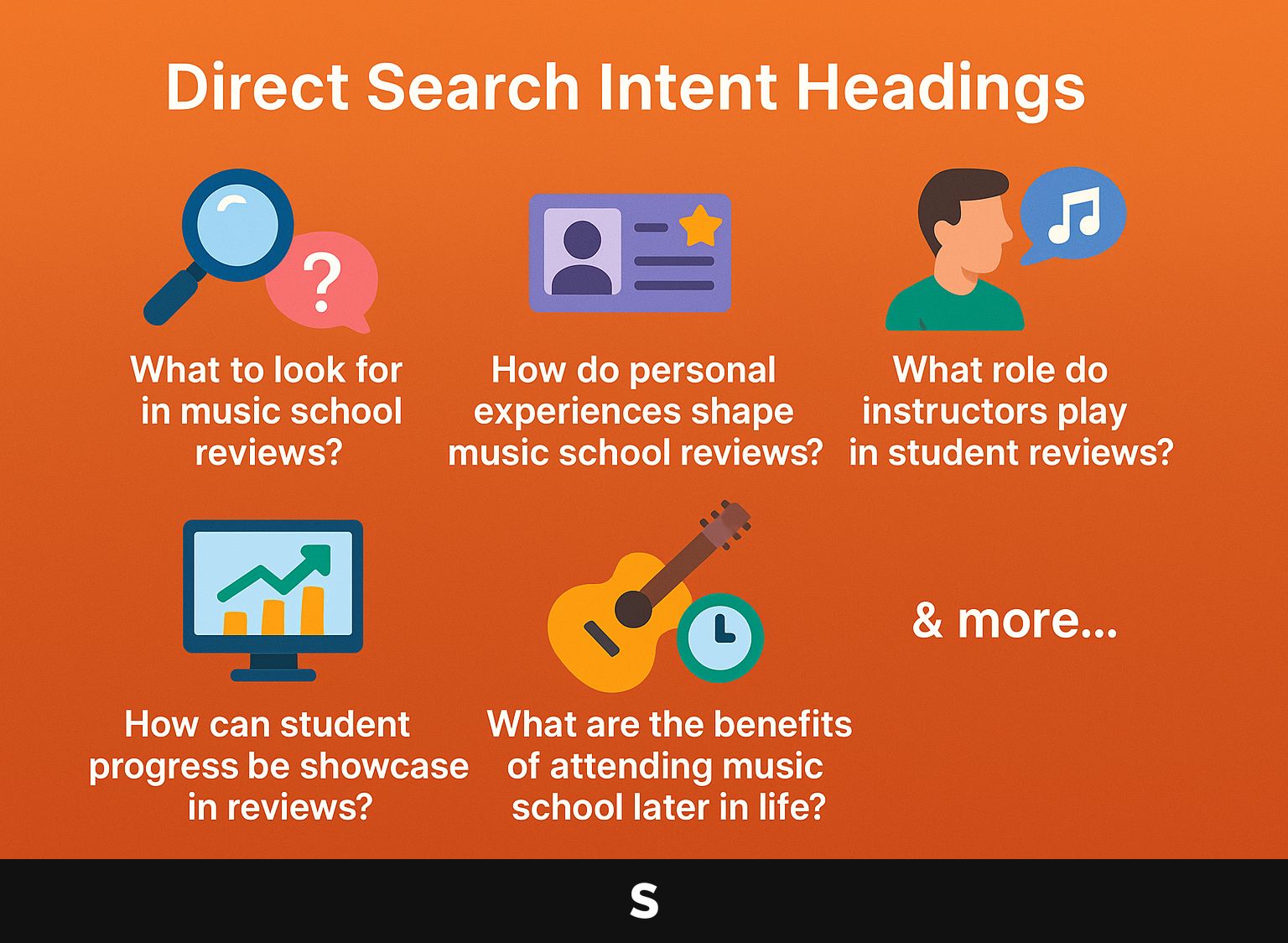
1. What to look for in music school reviews?
When evaluating music school reviews, it’s essential to look for specific criteria such as the teaching methods employed, the types of programs offered, and student progress over time.
Consider the qualifications of instructors, as experienced teachers can significantly influence student outcomes. Check reviews that talk about class sizes; smaller classes can provide more individual attention and improve learning.
Look for specific examples of student success, like winning competitions or receiving scholarships, to understand how well the school performs. Stories about successful students can help others see their own potential and show how important these examples are in making choices.
2. How do personal experiences shape music school reviews?
Personal stories make music school reviews feel real and genuine, as they show the difficulties and successes students go through.
For example, a student might tell how they got over their fear of performing in front of people and became more confident by acting in plays. This demonstrates the emotional growth that can inspire new students.
They could talk about particular experiences, such as successfully completing a challenging solo or being part of a group project that created a feeling of togetherness.
Reviews that mention helpful staff or creative teaching methods can give a clear view of the school’s atmosphere. Encouraging students to reflect on their personal experiences will make the process more engaging and draw in new applicants.
3. What role do instructors play in student reviews?
Teachers significantly influence student experiences and the feedback they provide, often focusing on the teachers’ methods and the effect on their development.
At the Nelly Berman School, teachers like Mr. Berman are patient, providing individual feedback and making a nurturing environment for young musicians. Ms. Smith is known for being flexible and often changes her lessons based on students’ progress, ensuring ideas are clear.
Students frequently praise their ability to inspire confidence, as seen in reviews mentioning how Mr. Berman’s nurturing guidance helped them overcome stage fright. These qualities improve skill development and help create a positive environment that supports trying new things and being creative.
4. How can student progress be showcased in reviews?
Discussing student progress in reviews can demonstrate how a music school helps students reach important milestones and successes that new students might find useful.
For example, mention a student who learned their first song in three months, demonstrating their confidence when performing.
Include reviews that cover technical skills and emotional progress, such as getting over stage fright. Encourage students to share experiences from recitals or competitions, which demonstrate personal development.
Tools like Google Forms can facilitate the collection of these testimonials, helping to gather authentic feedback that speaks to the school’s nurturing environment and effective teaching strategies.
5. What are the benefits of attending music school later in life?
Attending music school later in life offers unique benefits, such as the opportunity for personal growth, emotional fulfillment, and the pursuit of lifelong dreams. Adult learners often connect with passionate instructors who inspire creativity and encourage exploration of new genres.
A student from the Nelly Berman School shared how their teacher’s helpful method made learning music theory easier and more engaging.
Friendship among classmates makes learning lively and engaging. Many students say they make lasting friendships, play in group performances, and share their experiences in music. This helpful group improves learning and creates a feeling of togetherness and common interest in music.
6. How do recitals and performances impact student confidence?
Recitals and performances play an important role in music education. They greatly increase student confidence and allow them to demonstrate their progress to an audience.
At the Nelly Berman School, events like the spring recital and ensemble showcases give students important chances to perform in front of an audience. These events encourage participants to prepare diligently, enhancing their practice routines and accountability.
For example, many students say they feel both excited and nervous before the spring recital, which pushes them to improve their pieces even more. Seeing others perform builds a helpful environment, motivating everyone to do their best and get better at being on stage and performing.
7. What elements contribute to a motivating learning environment?
A positive learning space is created through encouraging teaching methods, community participation, and attention to student happiness and improvement.
Teachers provide individual feedback and change lessons to suit each student’s requirements, similar to what is done at the Nelly Berman School.
Working together helps students feel included. For example, performing in group recitals helps students learn from and encourage each other.
Workshops on improvisation and classes on composition give students the chance to express themselves in their own way, strengthening their passion for music and learning.
8. How can reviews help students in learning music?
Reviews can guide students by illuminating the strengths and weaknesses of music programs, helping them make informed choices that best suit their educational paths.
When evaluating reviews, students should focus on specific aspects such as curriculum quality, teacher qualifications, and student support services.
For example, find reviews mentioning practical experiences, such as performance exercises or workshops, which improve learning. Consider the frequency of feedback; programs that consistently receive positive ratings from multiple sources may indicate a reliable experience.
Websites like GreatSchools and Niche have many reviews, and YouTube features personal stories from students about their daily experiences in the program.
Why Music Education Matters
Music education plays a key role in personal development and learning. It boosts skills like creativity, discipline, and teamwork. In music classes, students explore different cultures and histories, broadening their knowledge of the world. Music education also supports emotional growth and offers students new ways to express themselves.
By putting music in school programs, we give students additional tools to succeed in their future jobs. Music education is important for developing talent and creativity in people of all ages, adjusting to each person’s needs.
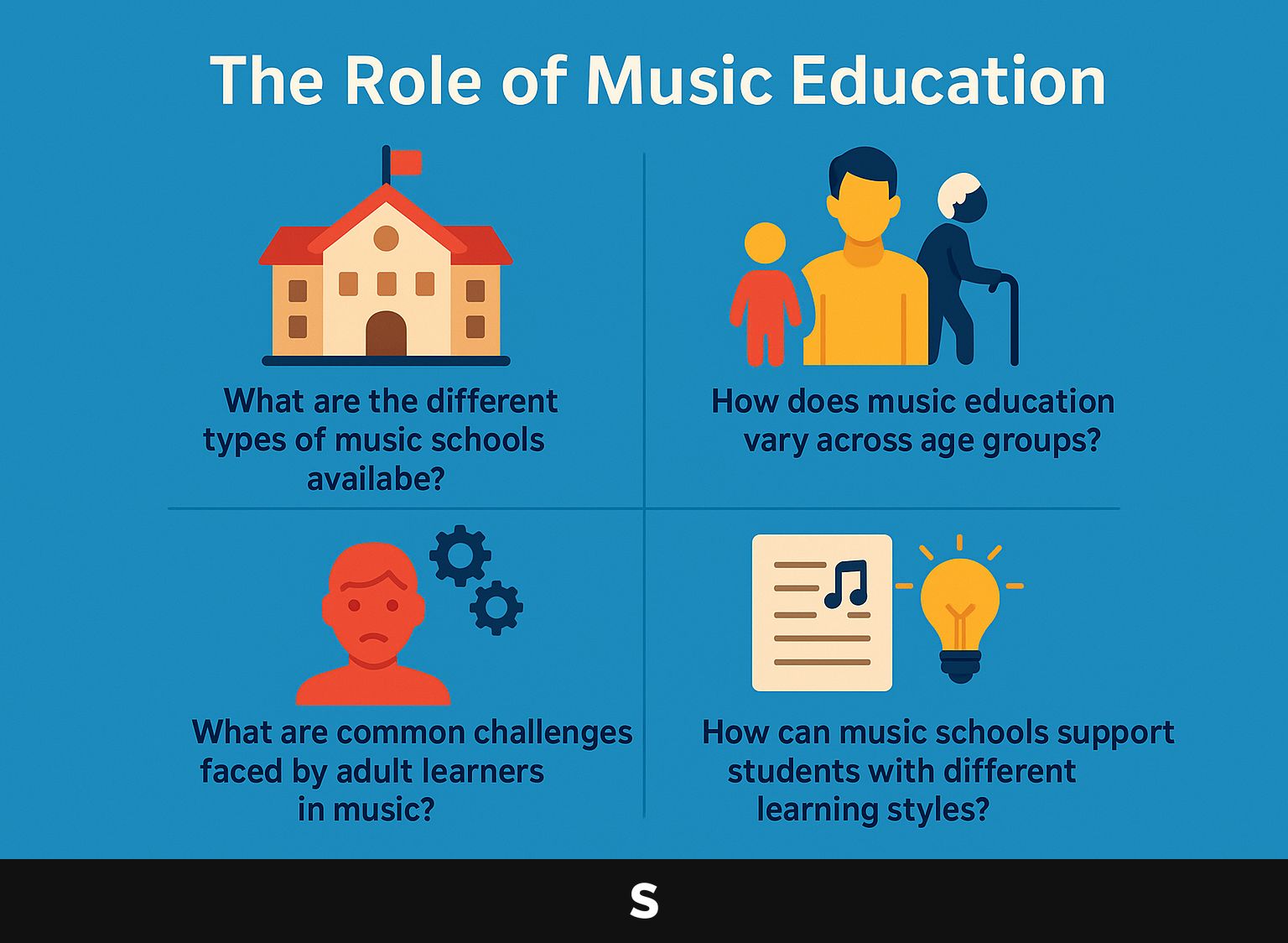
1. What are the different types of music schools available?
There are various types of music schools, each offering specialized programs that cater to different musical interests and community needs.
Music schools usually offer thorough training with a focus on playing and music theory, perfect for those aiming for a job in music. Programs can include classical performance, composition, and music education.
Community schools, on the other hand, offer a more relaxed environment, typically providing group classes for beginners and casual musicians. These schools often emphasize accessibility and affordability.
Private studios may offer one-on-one lessons focused on personal goals, like learning an instrument or getting ready for auditions. Carefully consider your musical aspirations when choosing the right school.
2. How does music education vary across age groups?
Music education changes a lot depending on age groups, with programs designed to meet the growth and feelings of children, teens, and adults.
For younger children, the Suzuki method focuses on listening and repetition, creating a natural space for learning. As children grow, programs may introduce more structured approaches like traditional lessons and music theory.
Teenagers often do well in group activities, where working with others and interacting with peers helps them improve their skills. In contrast, adult learners benefit from flexible classes, focusing on personal goals or specific genres.
The Nelly Berman School, for example, provides customized classes that help adult students follow their interests and build a strong base in music.
3. What are common challenges faced by adult learners in music?
Adult learners often face unique challenges in music education, including time constraints, self-doubt, and the need for a supportive learning environment.
To tackle these problems, having a flexible schedule is important. Schools like the Nelly Berman School offer evening and weekend classes, allowing learners to fit lessons into their busy lives.
Mentorship programs connect beginner students with experienced musicians, helping them build confidence and offering one-on-one advice. Online resources like video tutorials and practice apps can also supplement traditional learning, enabling students to progress at their own pace. Using these methods, adult learners can greatly improve their music education experience.
4. How can music schools support students with different learning styles?
Music schools can support students with different learning styles by offering customized lessons and teaching approaches that suit each student’s needs.
In real life, this can be done through practical activities like instrument workshops, where people who learn best by doing can actively participate in creating music. Visual aids, such as color-coded sheet music or diagrams of musical concepts, are particularly beneficial for visual learners.
Schools such as Berklee College of Music use group activities, encouraging students to make and perform music together, which promotes social interaction and listening skills.
By combining these strategies, music programs can create a rich, inclusive environment that nurtures each student’s unique learning style.
How Technology Affects Music Education
Technology is changing how music education works, providing students with new methods to learn and demonstrate their progress from a distance.
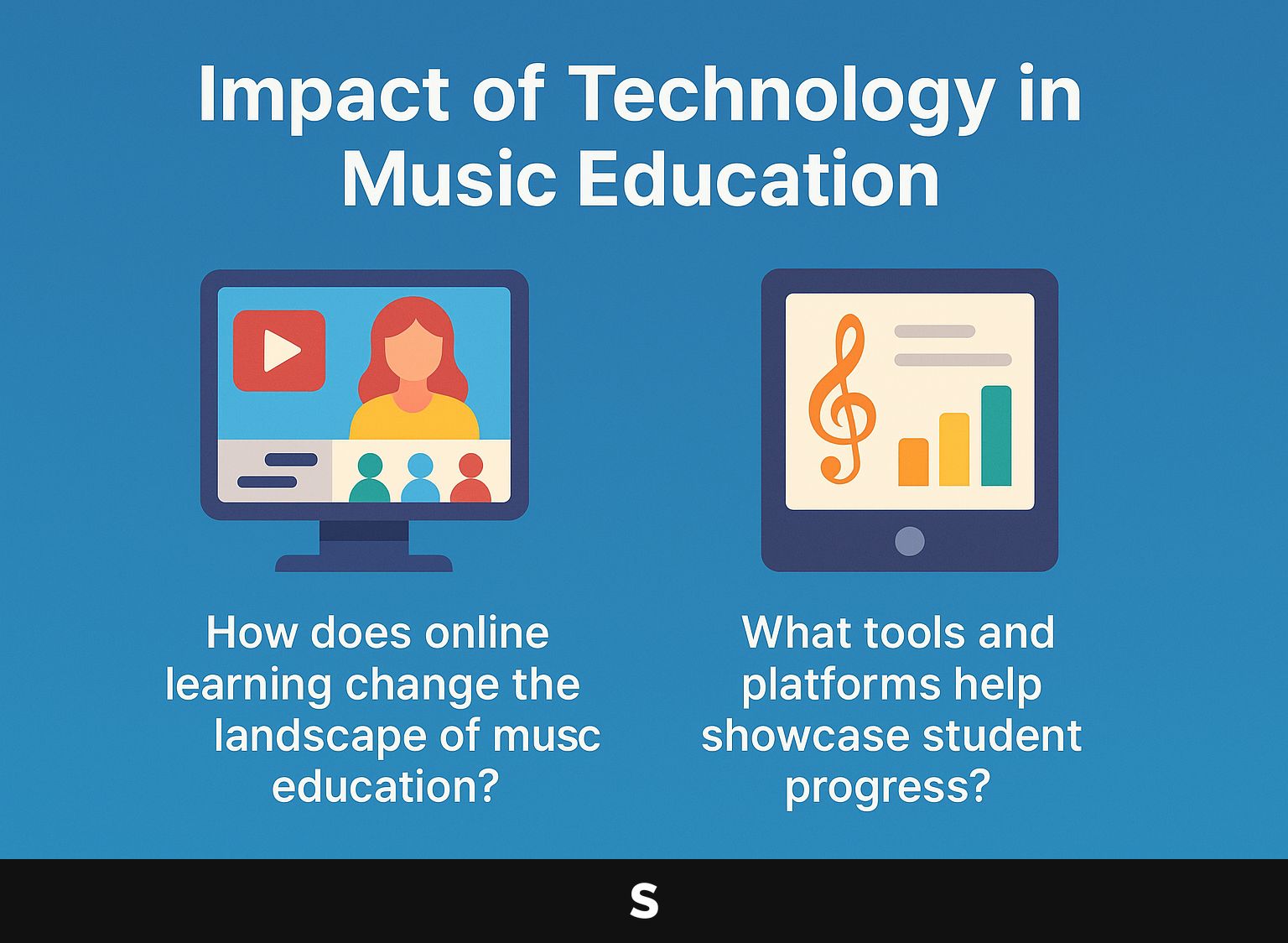
1. How does online learning alter music education?
Online learning has shifted music education by allowing students everywhere to easily reach resources, teachers, and peer support. This change lets students study at home and experience many different teaching methods.
Platforms like Berklee Online offer professional-level courses, enabling learners from anywhere to study music production or theory. MasterClass has famous musicians teaching through high-quality video lessons.
While flexibility is an advantage, students may miss the immediate feedback found in traditional settings, which can impede progress. To address this, many online programs now include live feedback sessions through video calls, improving the learning process.
2. What tools and platforms help showcase student progress?
Tools like Spokk.io enable music schools to showcase student progress effectively, providing a platform for feedback and visible growth.
Along with Spokk.io, consider implementing tools like Google Classroom for seamless assignment tracking and student interaction. Use Edmodo to facilitate a shared space for student progress, enabling easy feedback and sharing of resources.
For a more gamified approach, ClassDojo motivates students by recognizing achievements in real-time. Start by offering training for teachers and students to make sure everyone understands how to use these tools. Regular updates and displays of how students are getting better can increase their interest and motivation.
Creating a Musical Community
Creating a music-focused community is important for encouraging students to grow and develop an interest in music, regardless of their age.
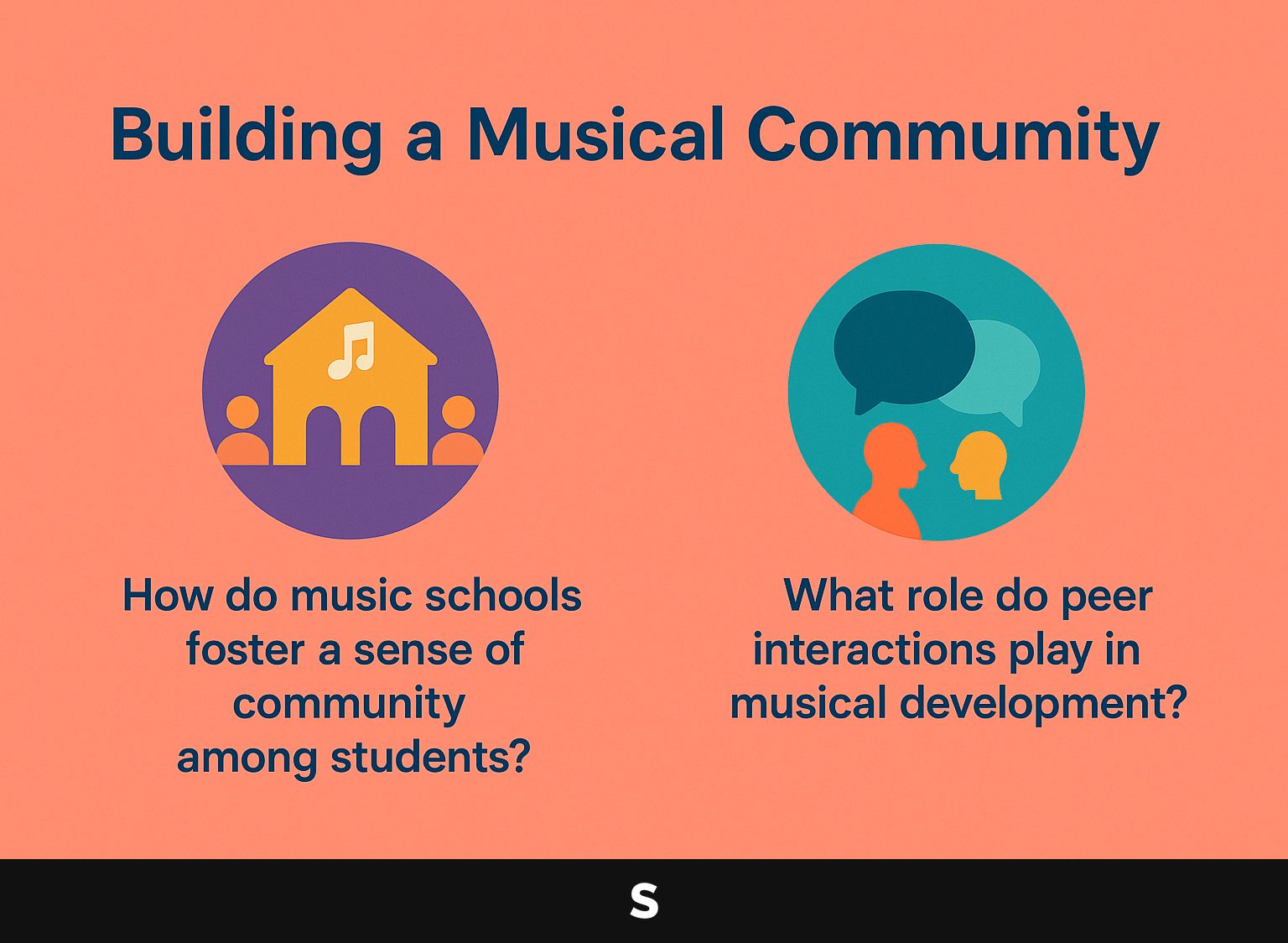
1. How do music schools create a sense of belonging for students?
Music schools build a community by giving students chances to work together, perform, and socialize.
For instance, group classes allow students to learn together, enhancing their skills while forming friendships. Schools such as the Nelly Berman School organize small music groups where musicians work together on songs, giving important practice in playing as a group.
Community concerts provide students a chance to show their skills, encouraging backing from family and friends. Engaging in local music festivals or hosting open mic nights can also strengthen ties within the community, inspiring students to participate actively and develop their artistry in a supportive environment.
2. What role do peer interactions play in musical development?
Peer interactions play an important role in learning music. They give students chances to learn from each other and create supportive friendships.
Collaborative learning in music schools thrives through peer-led projects, such as ensemble performances or joint composition workshops.
For example, a few students can plan a chamber music concert. This lets them exchange ideas, receive feedback, and improve their abilities together.
In the same way, workshops led by knowledgeable students offer a place where beginner musicians can ask questions and get personalized help.
Tools such as social media groups or platforms like Soundtrap help students work together regularly, allowing them to share recordings and ideas outside of school.
Success Stories and Feedback
Stories and comments from past music school students motivate current and upcoming students, highlighting the advantages of a strong education.
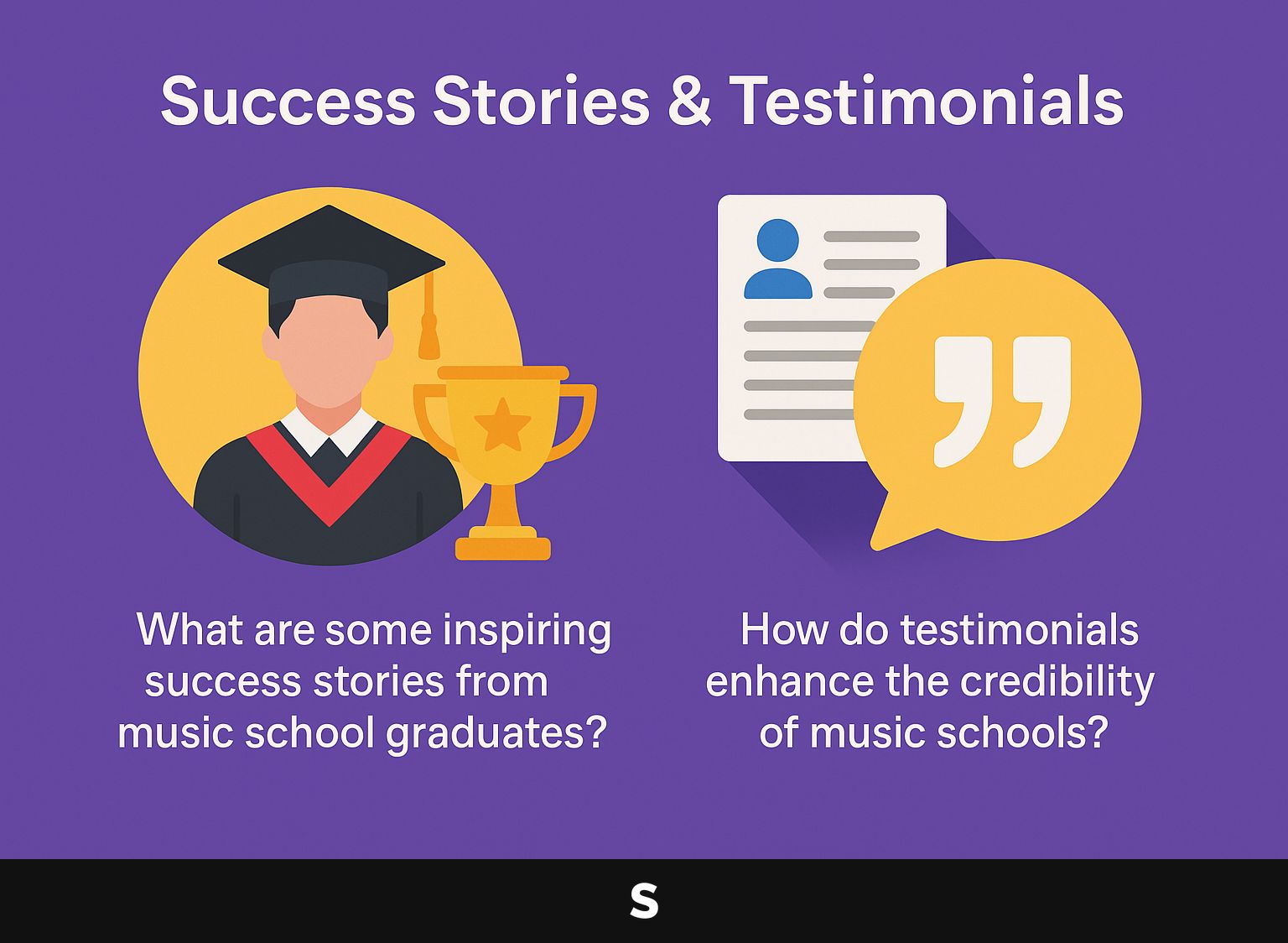
1. What are some inspiring success stories from music school graduates?
Inspiring success stories from music school graduates illustrate the potential for personal and professional growth through dedicated music education.
Take, for example, Sarah Thompson, a graduate from the Berklee College of Music, who went on to produce Grammy-winning albums. She credits her time in school for providing both the technical skills and industry connections necessary for her success. “The teamwork and guidance were extremely helpful,” she says.
James Lin, a Juilliard graduate, now leads a famous orchestra. He credits his leadership skills to the intense training and performance practice he got there. Both show how a solid background in music education can help advance careers.
2. How do testimonials make music schools seem more trustworthy?
Testimonials help build trust in music schools by sharing students’ personal stories, which can shape potential students’ views.
To make testimonials really work, ask students to talk about specific parts of their experience. A student could describe how performing in front of others made them more confident or how classes that focused on what they like helped improve their music skills.
Use platforms like Google Forms or SurveyMonkey to gather these testimonials. Be sure to ask open-ended questions to get detailed responses. Regularly showcase these testimonials on your website and social media channels, both in text and video format, to create a relatable narrative that appeals to potential enrollees.
The Changes in Music Education
Teaching music in new ways now emphasizes flexibility, being open to everyone, and using technology to meet the needs of different students.
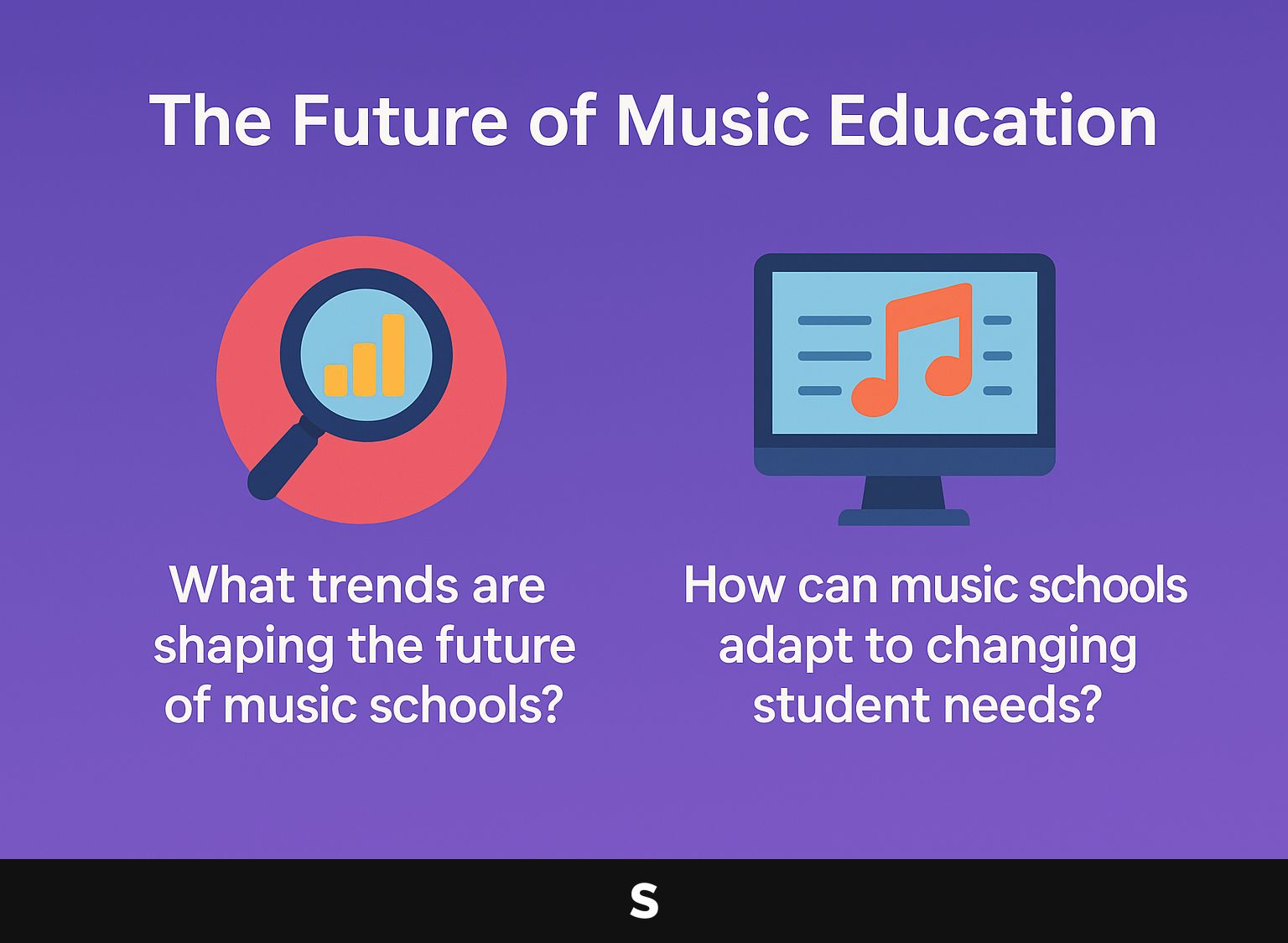
1. What changes are influencing the direction of music schools?
Trends like online learning, a stronger focus on mental health, and using technology are influencing how music schools will operate.
For example, many music schools now offer online classes and virtual lessons for instruments, making it possible for people everywhere to get an education.
Schools like Berklee College of Music have integrated mental health workshops into their curricula to support students’ well-being, addressing the pressures of performance. Students are using tools like SmartMusic and platforms like Soundtrap to collaborate online.
By adopting these trends, music schools can create a more flexible and supportive environment that caters to the needs of today’s learners.
2. How can music schools adjust to meet the shifting needs of students?
Music schools can meet different student needs by offering adjustable class schedules and custom lessons that match each person’s goals and way of living.
For instance, schools can introduce hybrid models that blend in-person and online lessons, allowing students to balance their musical education with other commitments.
Offering a diverse range of courses, such as jazz, classical, and digital music production, caters to various interests. Using tools such as Zoom for online classes or SmartMusic for practice makes learning better.
Schools like the Berklee College of Music have successfully adopted these strategies, resulting in higher student satisfaction and enrollment rates.
Frequently Asked Questions
1. What is the purpose of music school reviews?
Music school reviews serve as a way for potential students to gauge the quality of instruction and overall experience at a particular school.
2. How can reviews of music schools influence my path in learning music?
Music school reviews can offer information about teaching styles, instructor traits, and student improvement, which can encourage and direct people in learning music.
3. Are all music school reviews positive?
No, not all music school reviews are positive. Reading different reviews helps you see both the positives and negatives of the school.
4. What should I look for in music school reviews?
When reading music school reviews, it is important to look for consistent themes or patterns, as well as specific details about the instruction, facilities, and overall experience.
5. Can music school reviews help me choose the right school for me?
Yes, music school reviews can be a helpful tool in choosing the right school for your individual needs and goals. They can provide useful information about how past and current students have performed and what they experienced.
6. Do music school reviews only focus on the school’s reputation?
No, music school reviews also often highlight the progress and success of individual students, showcasing the potential and benefits of attending a specific school.
